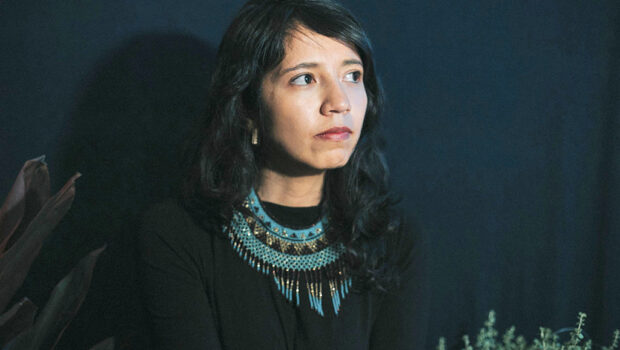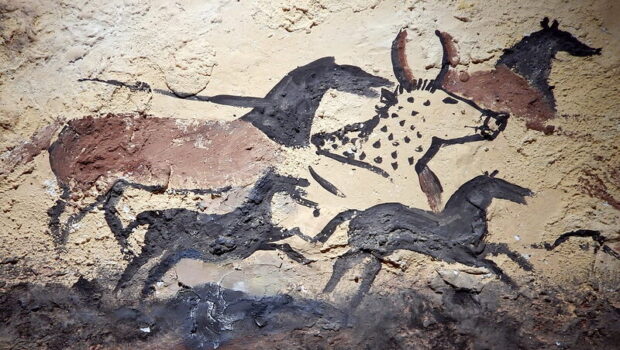DO WE EVEN KNOW HOW TO LOOK ON THIS QUIVERING WORLD?
¿ACASO NOSOTROS SABEMOS MIRAR EN ESTE MUNDO PALPITANTE?:
Cristina Rivera Garza
A Geological Writing by Claudia Peña Claros
The Dying of the Senses
There are trees in “Destello/ Flare”, the first short story included in Los árboles/ The Trees, a collection authored by Bolivian writer Claudia Peña Claros, a novelist and a poet. These trees, which oversee everything in the countryside, look as if they were suspended in midair. “Do they feel any attachment?” Someone or something asks. An impersonal voice, a point of view firmly anchored in the third personal singular, relates the time, perhaps ancestral, that signaled their evolution: “Many rains have passed by above those trees and lots of winds and more moons and, when the forest was still here, wild animals, the rituals of the wild packs.” Later on, a similar impersonal voice wonders aloud: “With what eyes would trees look down on this man still wrestling down there, in the red mud of the earth.” The questions about the perception of trees, about the capacity of trees to perceive its surroundings and react to them, continue, facilitating the unfolding of a seemingly simple plot: a man has been killed and, very slowly, at a snail pace, death is dawning on him as he finds himself shoeless and in the open, barely covered by the foliage of the trees. He did not expect the three shots that opened his chest, ripping the night apart with their flares. Death is overcoming him little by little, and language, very much like the dying man himself, is struggling in the mud to open the experience up to him and, simultaneously, to others. The fallen man is learning about his own death while we, the readers, overlook and pry, barely containing our breath. Is this really happening? Is death what is behind this fistful of unruly words? As the senses break down and language refuses to convey meaning as if nothing were happening, at times stuck in a knot of its own making, and at times loosening its own grip in never ending digressions, who or what is in charge of registering in such a great detail the distinct phases of passing away? I have never before been this close to the act of dying, except when I read Marguerite Duras, C´est tout, translated by Richard Howard as No More.
The Third Person and the Impersonal
As wide range of authors approach the writing challenges posed by the capitalocene, willingly decentering the human perspective and admitting the points of view of organic and non-organic entities, animals and plants and rocks included, perhaps one of the most vital questions remains: how to best convey the perception or knowledge of non-human beings? A rich literature on the secret lives of trees, stones, jelly-fish or bread has become accessible to contemporary readers, furnishing them with concrete data covering issues from their neural systems to the antics of their perceptions. As most writers know, however, points of view are usually as much a matter of information as of aesthetics or politics. What would be a good pronoun for a rock up until now thought of as inert? Are sea-horses better described in the feminine or the masculine (given the fact that males give birth)? Will birds in a flock respond better to a singular or plural pronoun? If so, would they opt for the we that unifies, often without asking for permission, or a they that interrupts the makings of community? I believe these to be the questions at the very core of Los Árboles. Claudia Peña Claros has not only taken the short story away from the cities and urban centers, where the form has grown steadily throughout the twentieth century, and into the countryside, where a new rural narrative has surged with incredible force as of late; she has also fully accepted the writerly challenge such a massive move conveys. Her characters are peasants and agricultural laborers, precarious cowboys and wives living on the fringes of urban areas who have not been steady features of most contemporary Latin American narrative. In addition, and boldly, Peña Claros has also worked closely with the perspective of other constituents of the countryside: trees, indeed, but also the monte as such, the forces of water unleashed, dogs, and even insects. This is no longer the jungle of the nineteenth century, espousing barbarism and threatening civilization in its wake, but a countryside that is a territory where sovereignty and property are always in dispute, as are processes of production, extraction, and accumulation. These are the territories where a good percentage of the poor live and thrive, resisting—and often failing against—the onslaught of capitalism and a host of neo-liberal policies. Many so-called green revolutions have emerged in these sites, unleashing predatory agricultural practices that violently intrude upon the natural world and its delicate balance as well as different forms of popular insurrection. And, by encompassing the multi-layered materiality of the territory, through her willingness to dig deeper and deeper, uncovering experiences that concern and affect human and non-human beings alike, this becomes a fine example of geological writing. How can a writer better put across the manifold perspectives of a world in constant turmoil?
Claudia Peña Claros, for whom writing revolves around attention, that is to say, paying close attention to what lies before her senses, moves freely in a space Alberto Moreiras has called the impersonal, in turn based on a critical understanding of the third person, which “according to Benveniste, does not have a personal connotation but refers to a notion able to go beyond the dialogical subjectivity and reach singularity, even plural singularity. It is the verbal form whose function is to express the no-person.” The impersonal, which Moreiras also links to critical concepts of person developed, among others, by Simone Weil, “is a landscape beyond the I or the we, and thus a landscape toward the third person, toward that that is innominate, toward that that is anonymous.” To be clear, Moreiras is here working within a politics of separation, clearly dividing life from politics against any political subjectivation and toward a counter-communitarian thinking and practice, central features of his notion of infrapolitics. Yet, this concept, the concept of the impersonal rooted in a third person that evades political subjectivation, may help understand the unique, irreverent work Claudia Peña Claros has undertaken in terms of point of view and, more generally speaking, narrative, as she explores the rural, impoverished worlds, that are central to Los árboles.
Flare
If we agree that poetry, as Lyn Hejinian famously argued, is the language with which we investigate language, we would have to accept that “Flare,” the short story that opens Los árboles was written by a poet. Eschewing plot and emphasizing instead the materiality of language, Peña Claros refuses capitalization and, often enough, paragraphs altogether, opting for what appears to be short packs of lines barely put together interrupted, in turn, by brief stanzas. “one / two / three.” A line for each one of these succinct words. Is this the beginning or the continuation of a larger process we interrupt with our reading? Because events included here have not fully gone through the consciousness of the character, but rather are in a radical in-progress stage because the gerund of dying has to reject the very notion of completion, “Flare” remains at once open and disconcerting. Rather than unfolding, the narrative here gets stuck or digresses and, as such, prevents the confirmation of meaning. Narrative strikes here as an anti-narrative device, folding, rather than unfolding, meaning over time.
Like the dying character himself, readers have not been provided with contextual information to clearly position this death on a political or historical continuum. And we follow him, in shared astonishment, as his knees and ankles fail and he trips and falls, bewildered. We investigate his lack of shoes with his same ardent curiosity and feel the warm, sticky clay beneath his hands, with which he tries to stop the gushing of blood, to no avail. Who or what wonders, then, about the trees capacity to perceive the surrounding world? Who or what reflects on the dying man´s naked feet and the fact that only those who have loved him, those who have seen him shoeless one wonderous morning, would be able to identify the corpse? Who or what moves between the past and the present, illuminating the passage of time with flares that, eventually, will cease, closing the sky up? Who or what breaks the narrative once and again, forcing readers to dwell in the processual landscape formed by the man and the monte, both dying at once? I am arguing that the who or what of this anti-narrative short story constitutes the foundation on which Claudia Peña Claros is building an impersonal space that rejects political subjectivation. “Flare” third-person perspective, which any creative writing manual would describe as effortlessly moving between the omniscient and the limited narrator, affords the possibility of singularity, even a plural singularity, by virtue of the millimetric attention that exposes fiction “to its own facticity.” Nothing escapes the attention of the narrative point of view, neither what has happened before nor what would conditionally happen afterward. As the dying man breathes in and breathes out, attempting to give shape to the inconceivable, the grass and the horse, the rope and the latch are already in the process of forgetting him. His hand is slowly becoming not his hand. Not his. Not him. He is turning into a not-himself before our eyes. Claudia Peña Claros knows that only an impersonal perspective, one able to express an experience beyond the politically entrapped notion of person, could do justice to the dying of a man on a monte where the crossing of property lines may bring on a death sentence.
From we to they
Two of the stories of Los árboles are told from the first-person singular point of view; two from the first-person plural point of view; the rest may be adequately described as using the third-person perspective. The I, we, and s/he stories all submit themselves to a radical facticity: the work of the senses brings up in each case the materiality of both the world the story is linked to and the language at play in its investigation. In each case, however, the decision is less a matter of mere functionality and more a question of a form deeply linked to the critical capacity of writing. In “El dios /God” a third-person singular recounts the story of a girl who faces a deadly flooding in the countryside. As the water rises up and young horses are able to escape the deluge, leaving old horses, heavy cows and trees behind covered by the currents, the girl, who has taken refuge on the roof of her house, carries a last piece of bread in her pocket. The silence surrounding the disaster fills the atmosphere as a beast-dog looks down on the remains: some foliage, a couple of dogs, a few inches of a rooftop. Her decision, a decision prompted by a point of view that allows for her singularity (not her individuality), hurls her into the rising water. The pair of dogs, her dogs, beating their tails and barking at her as she gets rid of her red dress and dives in, wait for her, “enthusiastic, loyal.”
Conversely, in “Bosque / Forest,” the story which with the collection concludes, a first-person plural narrative unfolds as a group of men walk aimlessly through a humid territory brimming with plants of enormous foliage and swarms of unknown insects. Lost in the wilderness, the group, which is mostly referred to in the we, is unable to orient itself, ambling about sorely exhausted, and increasingly without hope. They are in the heart of the monte and, as they walk, they realize that “what our hands do out there, becomes useless in the monte; what we need them to do here, our hands just don´t know how to do it.” Some men give up entirely and, knowing that this is a death sentence, they nonetheless to sit down in places “that immediately become depositaries of the rubble tree despise.” Right in the heart of darkness, where there is “not an inch of free space, not a single place where they could lie down and dream,” they “listen to fear, which is approaching as a murmur in between the threes, filling in the empty trunks, the eyes of the wasps, the dead leaves.” Unchanging, the sound of the monte numbs them. As leaves continue to cover their heads, sticking to their sweaty bodies, they become little by little one with the monte. The fusion, which is deadly, completes the we, linking human and non-human beings in an asphyxiating unity: “the rotten leaves on the ground will swallow my footprints and all the stench of my body will melt away in humidity…until merging and becoming one with everything.”
In Infrapolítica, Moreiras makes a case for the impersonal as the only way to effectively fight against the political subjectivation of the we. It is through the third person that we choose “not our freedom,” he says, “but everybody´s freedom.” While the community of the we generates a political subject, thus contributing to the history of domination; the passage through the impersonal is the “attempt to produce a politics as a counter-communitarian history.” In this sense, only the third person truly admits the plural. Perhaps it is not at all a hare-brained proposition to read the wandering group of men who fall into the deadly embrace of the monte as the we of subjection; and the girl, who dives into the flood, as the decision-making process of a they afforded by the third person. The result is the same in both cases: death; but the process through which death is achieved varies radically. And if this is the case, are we, in fact, witnessing the same death?
Writing Under Duress
Trees are not the only non-human beings whose perception is invoked in Los árboles. A female dog roams “Lazos/Leashes,” the second short story of this collection, in a third-person limited perspective that skillfully evades the anthropomorphic trap. Cockroaches are both menacing and clairvoyant in “Cosas / Things,” through a first-person singular human point of view which, however, renders the insects´ actions with as acute distinction as the corrosive, inorganic behavior of sand. Insects, which crowd around several of these stories, have their own way to escape subjectivation, especially through sound. As Rossi Braidotti argued in Between the No Longer and the Not Yet, insects not only reproduce themselves at great speed, allowing for “fabulous mutations over night, but they too are fantastic musicians.” As they bite ears or buzz tirelessly around human heads, Peña Claros´ insects generate a sound, a music if you will, that reflects the precarious balance of a natural world under continuous siege. Just as José Revueltas took seriously, at times literally, the drama of the desert in Human Mourning, Claudia Peña Claros is dead serious about the importance of inter-species relationships throughout Los árboles. These contacts are not harmonious, to be clear, but on unremitting peril, the result of ecologies constantly, and often violently, intruded upon. Devastation, which is the sentence issued by late capitalism, turns on the sensory systems of animate and inanimate beings under threat. Writing here is the hyper-vigilance of matter.
Realities Not Yet Named
In “Mundo / World”, Peña Claros deftly juxtaposes the story of a breakup with the lynching of a woman on the street. Violence surrounds both events in an ominous context dominated by politics: “The world has been ending for months now. You walk and if you look at the faces you no longer recognize anyone. It is better not to trust. Politics invades everything. You talk with someone, with anyone, and after ten minutes he is already saying that if the president, if the Indians, that this land is ours and that they will not overwhelm us. Everyone has reasons to hate.” In a world on the brink of personal and social disaster, politics offer no relief. As the crowd surrounds the middle-aged woman, pulling her hair and kicking her in the abdomen, it is clear that politics only exacerbate partisanship and hatred. “Civil death for traitors,” announce the posters taped to the city walls. This is Moreiras’ biggest fear in Infrapolitics: the intrinsic inability of politics to escape “the construction of a closed militancy community around the leader.” While it is true that an excess of privilege-based immunity has shaped a world dominated by techno-capitalism and the instrumentalization of life, Moreiras raises troubling questions too about the possible threats that an excess of community —of blind alliance, of a we forged uncritically for its own sake, of a “mandate towards homogeneity” —would represent for the immunity of singularity.
Peña Claros is no stranger to the vehement brush of local politics. In fact, she was a high-ranking official, Minister of Autonomies, during the second term of controversial president Evo Morales. Trees is his first book after a silence of about 10 years. This is the voice of someone who has traveled long distances and is now back from what? And, most importantly, this is the voice of someone unpacking her belongings and slowly settling where? The world is over, rhythmically repeats to the narrator of “Mundo / World” as the violence of the crowd grows, marking, as a counterpoint, the rupture between the two women. A world has ended. But what may come next is nothing short of alarming: the hatred stemming from privilege and forms of identity politics incapable of providing a resolution to the never-ending battle over land tenure between indigenous peoples and those who are not. To be clear, the charge here is against politics as such. Not against this or that political faction, this or that policy, but against politics itself. And, in this aspect, Peña Claros seems to share Moreiras’s reservations about the inherent inability of politics to avoid systematic and suffocating control over life.
While the couple is dissolving and the beatings of the mob continue in “World,” the narrator´s voice points out: “The time for love is over. The houses will be covered with flags, the heads will be covered with flags, the same colors repeated on people´s mouths.” Out of the rubble of its gloomy present, the future peeks out with its teeth of homogeneity and division. The world no longer exists. The world is over. But who or what says so? Writing, as practiced by Claudia Peña Claros, says so. Only a writing attached with such rigor to the dense materiality of the world, capable of carving passages from the impersonal through the third person, could sound, with such audacity, the alarm of the end times: the radical suspicion about politics is here, but followed by an extreme attention to the potentiality of realities not yet named (and surely, for now, still unmentionable).
 Cristina Rivera Garza is a Mexican author and professor best known for her fictional work, with various novels such as The Iliac Crest winning a number of Mexico’s highest literary awards as well as international recognitions. She is a regular contributor of Literal Magazine via her column Overcast. Her Twitter is @criveragarza
Cristina Rivera Garza is a Mexican author and professor best known for her fictional work, with various novels such as The Iliac Crest winning a number of Mexico’s highest literary awards as well as international recognitions. She is a regular contributor of Literal Magazine via her column Overcast. Her Twitter is @criveragarza
©LiteralPublishing
Una escritura geológica de Claudia Peña Claros.
La muerte de los sentidos
Hay árboles en “Destello”, el cuento con el que abre Los árboles, una colección de la escritora boliviana Claudia Peña Claros (Santa Cruz de la Sierra, 1970), novelista y poeta. Estos árboles, que supervisan todo en el campo, parecen estar suspendidos en el aire. “¿Sienten apego los árboles?”, pregunta alguien o algo. Una voz impersonal, un punto de vista firmemente anclado en la tercera persona relata el tiempo, quizás ancestral, que marcó la evolución de estos seres: “Por sobre estos árboles habían pasado muchas lluvias y muchos vientos lunas, y cuando había el bosque, los animales salvajes también los ritos las jaurías los meses de criar”. Más tarde, una voz impersonal también se pregunta en voz alta: “Con qué ojos mirarían los árboles a este hombre que aún forcejeaba perdido allá abajo, con el barro rojo de la tierra”. Las preguntas sobre la percepción de los árboles, sobre la capacidad de los árboles para percibir su entorno y reaccionar ante él, continúan, facilitando el desarrollo de una trama aparentemente simple: un hombre ha sido asesinado y, de manera muy lenta, a paso de tortuga, la muerte está cayendo sobre él ahí, donde se encuentra descalzo y al aire libre, apenas cubierto por el follaje de los árboles. No esperaba los tres disparos que abrieron su pecho, desgarrando la noche con sus destellos. La muerte se lo está apropiando poco a poco, poco a poco lo está venciendo, y el lenguaje, muy parecido a la experiencia del propio hombre moribundo, lucha con el barro para darle paso a la experiencia, volviéndola cognoscible o, al menos, enunciable, tanto para él mismo como para todos los demás, que leemos. El hombre caído reconoce y aprende sobre su propia muerte mientras nosotros, los lectores, nos detenemos un rato y nos entrometemos después, la respiración apenas contenida. ¿Esto realmente está sucediendo? ¿Es la muerte lo que detrás de este puñado de palabras desobedientes y meticulosas y recias? A medida que los sentidos se desmoronan y el lenguaje se niega a transmitir el significado como si nada estuviera sucediendo, como si todo fuera normal, a veces atrapado en un nudo de su propia creación y, otras, aflojando su agarre en digresiones interminables, ¿quién o qué está a cargo de registrar de manera tan detallada las distintas fases del fallecimiento? Nunca antes había estado tan cerca del acto de morir, excepto cuando leí Marguerite Duras, C´est tout, traducida al inglés por Richard Howard como No More.
La tercera persona y lo impersonal
A medida que una amplia gama de autores se acerca a los desafíos de escritura que plantea el capitaloceno, descentrando voluntariamente la perspectiva humana y admitiendo los puntos de vista de entidades orgánicas y no orgánicas por igual, animales y plantas y rocas incluidas, tal vez una de las preguntas más vitales sigue siendo: ¿cómo es posible identificar primero y compartir después la percepción o el conocimiento de los seres no humanos? Los autores contemporáneos pueden acceder a una rica literatura sobre la vida secreta de los árboles, las piedras, las medusas o el pan, los cuales les ha proporcionado datos concretos que abarcan aspectos desde los sistemas neuronales de los invertebrados hasta los subterfugios de los sentimientos de las plantas. Sin embargo, como la mayoría de los escritores saben, los puntos de vista suelen ser tanto una cuestión de información como de estética y política. ¿Cuál sería un pronombre apropiado para una roca, considerada hasta hace no mucho como inerte? ¿Se describen mejor los caballitos de mar en femenino o masculino (dado el hecho de que los machos dan a luz)? ¿Las aves en bandada responderán mejor a un pronombre singular o plural? Si fuera el plural, ¿se relacionarían con el nosotros que unifica, a menudo sin pedir permiso, o con el ellos que inaugura una narrativa de la dispersión? Creo que estas son las preguntas están en el núcleo de Los Árboles. Claudia Peña Claros no solo se ha llevado el cuento de las ciudades y los centros urbanos, donde la forma ha crecido constantemente a lo largo del siglo XX, hacia el campo, donde una nueva narrativa rural ha surgido con gran fuerza en la vuelta del siglo XXI, sino que también ha asumido completamente el desafío escritural que implica una mudanza tan masiva. Sus personajes son campesinos y trabajadores agrícolas, vaqueros precarios y esposas que viven al margen de las zonas urbanas, cuya presencia no ha sido prominente en la mayoría de la narrativa latinoamericana contemporánea. Además, y de manera audaz, Peña Claros también ha trabajado estrechamente con la perspectiva de otros componentes del campo: los árboles, sí, pero también el monte en cuanto tal, las fuerzas del desatadas del agua, los perros, e incluso los insectos. Esto ya no es la jungla del siglo XIX, denunciando a la barbarie que amenaza a la civilización a su paso, sino un campo que es un territorio donde la soberanía y la propiedad siempre están en disputa, al igual que todos los procesos de producción, extracción y acumulación. Estos son los territorios en donde habita un buen porcentaje de los grupos populares, donde viven y prosperan, resistiendo, y con frecuencia fracasando, ante los desastres naturales, la embestida desnuda del capitalismo, y una serie de políticas neoliberales. Muchas de las así llamadas revoluciones verdes han surgido en estos sitios, desatando por igual prácticas agrícolas depredadoras que invaden violentamente el mundo natural y su delicado equilibrio, así como diferentes formas de insurrección popular. En este abarcar de la materialidad del territorio en toda su complejidad, en su voluntad de ir hacia abajo, escarbando en capas de tiempo que son, a su vez, capas de experiencia, Peña Claros encara el tiempo profundo de la tierra, identificando las acciones que conciernen y afectan a una multiplicidad de seres humanos y no humanos por igual. Lo de Claudia Peña Claros es una escritura geológica que sigue preguntándose: ¿cómo se las arregla una escritora para encarnar de la mejor manera posible, de la manera más crítica posible, estas múltiples perspectivas animada e inanimadas de un mundo en constante agitación material?
Claudia Peña Claros, para quien la escritura implica sobre todo atención—prestar una suma atención a lo que encaran los sentidos—se mueve libremente en un espacio que Alberto Moreiras ha denominado como impersonal, a su vez basado en una comprensión crítica de la tercera persona, que “para Benveniste, no tiene una connotación personal, sino que se refiere a otro registro noción que es capaz de sobrepasar el de la subjetividad dialógica y alcanzar la región de la singularidad, incluso de la singularidad plural … Es la forma verbal que tiene la función de expresar a la no-persona”. Lo impersonal, que Moreiras también vincula a conceptos críticos de persona desarrollados, entre otros, por Simone Weil, “es un pasaje más allá del yo y del nosotros y, por lo tanto, un pasaje hacia la tercera persona, hacia lo innominado o lo anónimo”. Para ser claros, Moreiras está trabajando aquí dentro de y por una política de la separación, dividiendo de manera absoluta la vida de la política, contra cualquier subjetivación política y hacia un pensamiento y práctica contra-comunitario, características centrales de su noción de infrapolítica. Sin embargo, este concepto, el concepto de lo impersonal enraizado en una tercera persona que evade la subjetivación política, puede ayudar a comprender el trabajo único e despiadado que Claudia Peña Claros ha emprendido en términos de punto de vista y, en términos más generales, de narrativa, mientras explora los mundos rurales y empobrecidos que son centrales para los cuentos de Los árboles.
Destello
Si estamos de acuerdo en que la poesía, como argumentó Lyn Hejinian, es el lenguaje con el que investigamos el lenguaje, tendríamos que aceptar que “Destello”, el cuento que abre Los árboles, fue escrito por una poeta. Sacándole la vuelta al dominio de la trama y enfatizando, en cambio, la materialidad del lenguaje mismo, Peña Claros rechaza el uso de las mayúsculas y, a menudo, la formación de párrafos por completo, optando por lo que parecen ser grupos de líneas cortas que, apenas juntas, se interrumpen a su vez por breves estrofas. “uno dos tres”. Una línea para cada una de estas breves palabras. ¿Es este el comienzo o la continuación de un proceso más amplio que interrumpimos con nuestra lectura? Debido a que los eventos incluidos aquí no han pasado completamente por la conciencia del personaje, sino que están en una etapa de precesualidad radical; debido a que el gerundio de la muerte tiene que rechazar la noción misma de finalización, “Destello” permanece a la vez abierto y desconcertante. En lugar de desarrollarse, la narración aquí se atasca o se desvía y, como tal, impide la confirmación inmediata de significado alguno. La narrativa aparece aquí como un dispositivo anti-narrativo, que se pliega, en lugar de desplegarse, sobre el tiempo.
Como el propio personaje moribundo, a los lectores no se nos ha dado información contextual para ubicar claramente esta muerte en un continuo político o histórico. Y lo seguimos, en asombro compartido, mientras sus rodillas y tobillos fallan, y él tropieza y cae, desconcertado. Investigamos su falta de zapatos con su misma ardiente curiosidad, y sentimos la arcilla cálida y pegajosa debajo de sus manos, con la que intenta detener el chorro de sangre, sin éxito. ¿Quién o qué se pregunta, entonces, sobre la capacidad de los árboles para percibir el mundo circundante? ¿Quién o qué se reflexiona sobre los pies desnudos del moribundo y sobre el hecho de que solo aquellos que lo han amado, aquellos que lo han visto descalzo, una mañana maravillosa, podrían identificar el cadáver? ¿Quién o qué se mueve entre el pasado y el presente, iluminando el paso del tiempo con destellos que, eventualmente, cesarán, cerrando el cielo? ¿Quién o qué rompe la narración una y otra vez, obligando a los lectores a morar en el paisaje procesal que forman el hombre y el monte, ambos muriendo a la vez? Quiero argumentar aquí que el quién o qué de este cuento anti-narrativo constituye la base sobre la cual Claudia Peña Claros construye el espacio impersonal que rechaza la subjetivación política. La perspectiva en tercera persona de “Destello”, que cualquier manual de escritura creativa describiría aquí como moviéndose entre el punto de vista del narrador omnisciente y cuasi-omnisciente, ofrece la posibilidad de singularidad, incluso una singularidad plural, en virtud de la atención milimétrica que expone la ficción “a su propia facticidad”.
Nada escapa a la atención del punto de vista narrativo, ni lo que sucedió antes ni lo que condicionalmente sucederá después. Tanto los procesos de tiempo profundo como las minucias de la vida diaria, o de muerte súbita, permanecen bajo el microscopio de las palabras. Mientras que el mundo interno del moribundo permanece opaco, porque la lenta conciencia de su propia muerte constituye el nudo de esta trama, el narrador externo permite vislumbrar el drama material que lo rodea en todo su esplendor. Peña Claros ha hablado con cierta extensión sobre la distancia que establece entre la experiencia personal y la escritura. Esa distancia, que impide que la escritura se convierta en un mero instrumento de expresión, paradójicamente permite una proximidad material extrema con seres animados e inanimados por igual. El lenguaje de Peña Claros roza pacientemente, generosamente, con la máxima precisión, la superficie de todas las cosas. No hay prisa. Nunca la hubo. El lenguaje entra en los animales y las matas y la roca y el fuego, o deambula entre ellos, llevando la descripción y la conexión a niveles más complejos. Mientras el moribundo inhala y exhala, intentando dar forma a lo inconcebible, la hierba y el caballo, la cuerda y el pestillo ya están en el proceso de olvidarlo. Su mano se está convirtiendo lentamente en su no-mano. Él se convierte, poco a poco, en su no-él. El moribundo muta frente a los ojos de los lectores hasta que es ya su no-mismo. Claudia Peña Claros sabe que solo una perspectiva impersonal, un punto de vista capaz de expresar una experiencia más allá de la noción de persona (en tanto persona sujeta de lo político), podría hacer justicia a la muerte de un hombre en un monte donde el cruce de las líneas de propiedad puede conllevar una sentencia de muerte.
De nosotros a ellos
Dos de las historias de Los árboles se cuentan desde el punto de vista de la primera persona del singular; dos en la primera persona del plural; el resto podría describirse adecuadamente como historias contadas desde la perspectiva de la tercera persona. Todas estas historias del yo, al nosotros y ellos se someten a una realidad radical: el cruento trabajo de los sentidos plantea en cada caso la inescapable materialidad del mundo al que está vinculada tanto la historia como el lenguaje que la investiga. En cada caso, sin embargo, la decisión es menos una cuestión de mera funcionalidad y más una cuestión de una forma que se vincula y responde a la capacidad crítica de la escritura. En “El dios”, una tercera persona casi siempre omnisciente cuenta la historia de una niña que se enfrenta a una inundación letal en el campo. A medida que el agua sube y los caballos jóvenes pueden escapar del diluvio, dejando atrás a caballos viejos, pesadas vacas y árboles cubiertos por las corrientes, la niña, que se protege en el techo de su casa, lleva un último pedazo de pan en el bolsillo. El silencio que rodea el desastre llena la atmósfera a medida que un diosbestia se contenta con mirar lo que queda allá abajo: algo de follaje, un par de perros, algunas pulgadas de un techo. Su decisión, una decisión impulsada por un punto de vista que permite su singularidad (no su individualidad), la arroja al agua creciente. El par de perros, sus perros, moviendo sus colas y ladrándole mientras se deshace de su vestido rojo y se sumerge, la esperan en una actitud “entusiasta y leal”.
Por el contrario, “Bosque”, la historia con la que concluye la colección, se desarrolla casi siempre desde un punto de vista de la primera persona del plural mientras un grupo de cazadores camina sin rumbo por un territorio bochornoso, lleno de plantas de enorme follaje, y enjambres de insectos desconocidos. Perdido en esa zona verde y lúgubre, ominosa, el grupo, al que se hace referencia principalmente en a través del nosotros, es incapaz de orientarse, deambulando sin rumbo y exhausto, cada vez con menos esperanza. Están en el corazón del monte y, mientras caminan, se dan cuenta de que “lo que afuera nuestras manos hacen, en el monte es inútil; lo que necesitamos que hagan, nuestras manos no saben hacerlo”. La pregunta pronto se radicaliza, enfatizando la diferencia de saberes que permiten (o limitan) la sobrevivencia dentro y fuera del campo: “¿Acaso nosotros sabemos mirar en este mundo palpitante?”. Algunos hombres se rinden por completo y, aún sabiendo que se trata de una sentencia de muerte, se sientan en lugares que inmediatamente se convierten en “depositarios de los desechos que los árboles desprecian”. Justo en el corazón de su propia oscuridad, donde “no hay un espacio libre, nada donde poder recostar este sueño”, escuchan “el miedo que va llegando como un susurro por entre los árboles, ocupando los troncos huecos, los ojos de las avispas, las hojas muertas”. Inmutable, el sonido del monte los horroriza y los adormece. A medida que las hojas continúan cubriendo sus cabezas, pegándose a sus cuerpos sudorosos, se vuelven poco a poco uno con el monte. La fusión, que es mortal, expande y completa el nosotros del punto de vista, uniendo a seres humanos y no humanos en una unidad asfixiante: “las hojas podridas en el suelo se tragarán mis huellas y todos los hedores de mi cuerpo se desvanecerán en la humedad… hasta confundirse y ser uno con todo”. Los cazadores han sido cazados. El campo prevalecerá.
En Infrapolítica, Moreiras defiende lo impersonal como la única forma de luchar eficazmente contra la subjetivación política del nosotros. Es a través de la tercera persona, el lugar del narrador externo, la enunciación extradiegética que no es un personaje, que los autores eligen “no nuestra libertad”, dice, “sino la libertad de todos”. Mientras que la política genera un sujeto político, contribuyendo así a la historia de la dominación, el paso a través de lo impersonal, argumenta, es el “intento de producir la política como historia contra-comunitaria de lo neutro”. En este sentido, sólo la tercera persona, sólo el ellos, admitiría realmente el plural. Tal vez no sea una propuesta descabellada, entonces, leer el nosotros de la sujeción en el grupo errante de cazadores que caen en el abrazo mortal del monte; y vislumbrar el funcionamiento desvinculante del ellos en la decisión de la niña que se sumerge en el agua desatada por las inundaciones. Un punto de fuga. Una pequeña grieta en el círculo del nosotros. El resultado es el mismo en ambos casos: la muerte; pero el proceso por el cual se consigue o se llega a la muerte varía radicalmente. Y si esto es cierto, ¿estamos, de hecho, presenciando la misma muerte?
Escribir bajo amenaza
Los árboles no son los únicos seres no humanos cuya percepción se invoca en Los árboles. Así como José Revueltas se tomó en serio, a veces literalmente, lo que Elizabeth Povinelli llamó el drama del desierto, y la infraestructura que los humanos diseñaron para contenerlo, en El luto humano, Claudia Peña Claros también se toma muy en serio la importancia de los animales y las plantas, y las relaciones entre especies, en sus historias. Estos contactos no son armoniosos, para ser claros, sino que están en peligro incesante, el resultado de las ecologías intervenidas constantemente, a menudo con violencia, por los agentes financieros del neo-liberalismo. La devastación, que es la sentencia general emitida por el capitalismo tardío, enciende los sistemas sensoriales de los seres animados e inanimados bajo continua amenaza. Escribir, en estas condiciones, es la hipervigilancia de la materia misma.
Una perra deambula por “Lazos”, el segundo cuento de esta colección, en una perspectiva de la tercera persona limitada que evade hábilmente la trampa antropomórfica. Las cucarachas son a la vez amenazantes y clarividentes en “Cosas”, a través de un punto de vista humano en primera persona del singular que, sin embargo, hace que las acciones de los insectos sean tan notorias como el comportamiento corrosivo e inorgánico de la arena. Peña Claros ha dicho que, hasta el día de hoy, todavía recuerda la tortuga que cruza la calle en Grapes of Wrath de Steniback, y el comportamiento de los perros lobo en las novelas de aventuras de Jack London. Sólo puedo hacer una pausa para preguntarme cómo dialogaría Peña Claros con las Memorias de un oso polar de Yoko Tawada, la novela en la que ese mamífero enorme logra escribir la historia de su vida en constante exilio. La habilidad de observación de Peña Claros, así como la riqueza y precisión de su lenguaje, les da vida a las perras, las serpientes o los pájaros. Y también les da muerte. Ninguno de estos puntos de vista son meras decoraciones o metáforas, sino protagonistas por derecho propio en historias vinculadas al drama más amplio de la devastación material.
Los insectos, que se amontonan en varias de estas historias, tienen su propia forma de escapar de la subjetivación, especialmente a través del sonido. Como Rossi Braidotti argumentó en Between the No Longer and the Not Yet, los insectos no sólo se reproducen a gran velocidad, permitiendo “mutaciones fabulosas repentinas, sino que también son músicos fantásticos”. Mientras muerden oídos o zumban incansablemente alrededor de las cabezas humanas, los insectos de Peña Claros generan un ruido, una música si se quiere, que refleja el precario equilibrio del mundo natural bajo un asedio continuo. Los insectos son amenazantes porque, a diferencia de los humanos, pueden sobrevivir, en grupo al menos, al fin del mundo tal como lo conocemos. Y la autora detecta sus características y movimientos con la máxima precisión porque ésta puede ser su última oportunidad. El mundo está cambiando apresuradamente ante sus ojos, y los ojos, todos sus sentidos, están en modo de emergencia. Esta atención urgente y, acaso, absoluta, es el modo de la escritura frente a la extinción.
Realidades aún sin nombre
En “Mundo”, Peña Claros yuxtapone hábilmente la historia de una ruptura amorosa y el linchamiento de una mujer en la calle. La violencia rodea ambos eventos en un contexto ominoso dominado por la política: “Hace meses que afuera el mundo se ha ido terminando. Caminas y si miras a los rostros ya no reconoces a nadie. Es mejor no confiar. La política lo invade todo. Conversas con alguien, con cualquiera, y a los diez minutos ya está diciendo que si el presidente, que si los indios, que esta tierra es nuestra y que no nos avasallarán. Cada quien tiene razones para odiar”. En un mundo al borde del desastre personal y social, la política no ofrece alivio. Mientras la muchedumbre rodea a la mujer de mediana edad, jalándole el cabello y pateándola en el abdomen, está claro que la política solo agudiza el partidismo y el odio. “Muerte civil para los traidores”, anuncian los carteles pegados a las paredes de la ciudad. Este es el mayor temor de Moreiras en Infrapolítica: la incapacidad intrínseca de la política para escapar de “la construcción de una comunidad de militancia cerrada en torno al líder”. Si bien es cierto que el exceso de inmunidad con base en el privilegio le ha dado forma a un mundo en el que predominan el tecnocapitalismo y la instrumentalización de la vida, Moreiras plantea preguntas inquietantes acerca de las posibles amenazas que un exceso de comunidad—de alianza ciega, de un nosotros acrítico y porque sí, de “mandato hacia la homogeneidad”—representaría para la inmunidad de la singularidad.
Peña Claros no es ajena al roce vehemente de la política local. De hecho, fue una funcionaria de alto rango, Ministra de Autonomías, durante el segundo mandato del controvertido presidente Evo Morales. Los árboles es su primer libro después de un silencio de unos 10 años. Esta es la voz de alguien que ha viajado largas distancias y está ahora de vuelta ¿de qué? Y, lo que es más importante, esta es la voz de alguien desempacando sus pertenencias y estableciéndose lentamente ¿dónde? El mundo se ha acabado, repite rítmicamente al narrador de “Mundo” a medida que crece la violencia de la muchedumbre, que marca, a manera de contrapunto, la ruptura entre las dos mujeres. Un mundo ha terminado. Pero lo que puede venir después es poco menos que alarmante: el odio absoluto derivado del privilegio y de políticas identitarias incapaces de proporcionar una resolución a la batalla interminable alrededor de la tenencia de tierra entre los pueblos indígenas y los que no lo son. Para ser claros, la acusación aquí es contra la política como tal. No contra ésta o aquélla política, sino contra la política en sí misma. Y, en este aspecto, Peña Claros parece compartir los reparos de Moreiras sobre la incapacidad inherente de la política para evitar el control sistemático y cruel y sofocante sobre la vida. Mientras la pareja se está disolviendo y las golpizas de la turba continúan en “Mundo”, el narrador señala: “Se acabó el tiempo para el amor. Las casas se irán cubriendo de banderas, las cabezas se cubrirán de banderas, en las bocas de la gente los mismos colores repetidos”. Fuera de los escombros de su sombrío presente, el futuro se asoma con sus dientes de homogeneidad y de división. El mundo ya no existe. El mundo ha terminado. ¿Pero quién o qué dice eso? La escritura, tal como la practica aquí Claudia Peña Claros, lo dice. Solo una escritura con tal apego a la densa materialidad del mundo, capaz de tallar pasajes desde lo impersonal a través de la tercera persona, podría hacer sonar, con tanta audacia, la alarma de los tiempos que terminan: aquí hay una sospecha radical acerca de la política, sí, y también la atención extrema ante la posibilidad de realidades aún sin nombre (y seguramente, todavía por ahora, innombrables aún).
 Cristina Rivera Garza es la autora de Nadie me verá llorar (México/Barcelona: Tusquets, 1999), La cresta de Ilión(México/Barcelona: Tusquets, 2002), La muerte me da (México/Barcelona: Tusquets, 2007), Dolerse. Textos desde un país herido (Mexico: Sur+, 2011) entre otros. Su título más reciente es Había mucha neblina o humo o no sé qué (México: Literatura Random House, 2016). Es columnista en Literal Magazine. Su Twitter es @criveragarza
Cristina Rivera Garza es la autora de Nadie me verá llorar (México/Barcelona: Tusquets, 1999), La cresta de Ilión(México/Barcelona: Tusquets, 2002), La muerte me da (México/Barcelona: Tusquets, 2007), Dolerse. Textos desde un país herido (Mexico: Sur+, 2011) entre otros. Su título más reciente es Había mucha neblina o humo o no sé qué (México: Literatura Random House, 2016). Es columnista en Literal Magazine. Su Twitter es @criveragarza
©Literal Publishing. Queda prohibida la reproducción total o parcial de esta publicación. Toda forma de utilización no autorizada será perseguida con lo establecido en la ley federal del derecho de autor.










